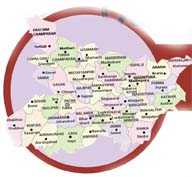 Intro: What the elections in Bihar showed was not a respect for principles but for the ever present caste system that is the bane of Bihar.?
Intro: What the elections in Bihar showed was not a respect for principles but for the ever present caste system that is the bane of Bihar.?
It may be quite some time since Narendra Modi made his Independence Day speech but it is never too late to report what the media has to say about it. So this is what The Free Press Journal (August 16) said and it deserves notice: “Modi’s wonted oratory was in full flow as he pressed all the right buttons to exhort India to get its act together. Modi mesmerised the nationwide audience, what is more he spoke from an open podium, not from behind a bullet-proof glass enclosure. Typically Modi began by calling himself a first servant of the people…. (which) was received with wild cheering from the distinguisted assemblage.”
Praising all the issues that the Prime Minister had raised, including the issue of female foeticide, added the paper: “This was a real Prime Ministerial address in the true sense of the term, with Modi displaying humility as the first servant of the people, exhorting them when necessary, gently guiding them when required and generally staying above the partisan fray. There was not a single false note in the entire address. Hope what he said he can implement in the years ahead. It was a stirring performance all the way.” Two days later the same paper reported that Modi’s popularity rating “had gone up further following the early morning address at the Red Fort. Even those who are viscerally hostile to him felt obliged to commend it.”
Following the bye-elections to Assembly seats in Bihar, Karnataka, Madhya Pradesh and Punjab in which the BJP lost six incumbent seats, the Economic Times (August 26) said it was “a major set back for a party basking in the euphoria of a historic Lok Sabha victory in May”. Said the paper: “It goes to the credit of Lalu Yadav and Nitish Kumar that they agreed to bury long-standing hostilities, swallow their pride and forge a formidable coalition spanning caste and religious identities.”
The Times of India (August 26) said that the bye-election results are “straws in the political wind” and the results in four states “show that NDA must focus on performance and outcomes now”.
The Hindu (August 26) noted that the latest round of by-election to Assembly seats will be remembered for the success of a political experiment in Bihar involving the coming together of three parties against the Bharatiya Janata Party. The results indicate how the battle lines will be drawn when Assembly elections are held in Bihar in 2015. As the paper noted “The three parties seemed to have done some strategic thinking in bringing together their combined vote base drawn from the Yadavs, other backward classes, dalits and Muslims.”
The Hindustan Times (August 26) felt that the Bihar bypoll results suggest that key players got the electoral maths right, but there was no wave. It said: “These bypoll results are in agreement with the general trend observed over the past few elections that the results of the Lok Sabha polls and those of the Assembly elections have thrown up divergent pictures, though there have been occasional departure from this pattern.”
The passing away of UR Anantamurthy drew serious attention in the media. The Indian Express (August 25) called Anantamurthy a “literary colossus” which indeed he was. As the paper noted,; Anantamurthy was” a crusader against populist writing” and one who explored how caste, dogma and religious scholarship played out in the face of the death of a Brahmin apostate. Anantmurthy was a Jnanpith awardee who examined India’s biggest dilemmas since Independence. Thus, as the paper pointed out, the writer in his famous works wanted to find out whether Brahmins and shudras were irreconcilable categories. Anantamurthy raised such issues as “Is medium education impoverishing our emotional lives? How can we retain our self-respect in a post colonial globalised age?” As the paper saw in his death, it has been a loss of “a literary colossus, provocateur and a supporter of many causes” who had “few peers in India”.
Likewise Deccan Herald (August 25) saw in Anantamurthy a ‘literary colossus’ among the rare breed who influenced several generations of people. The paper described him as a “multi-faceted personality who excelled as a teacher and administrator, igniting several young minds.” Asian Age (August 24) felt that “the Indian literary world has lost a giant, the intelligentsia a major voice and the country a person of impeccable intellectual integrity.”
The Hindustan Times (August 26 ) published a powerful article by Sitaram Yechury, CPM Politburo member which said that Anantamurthy “spoke about all our dreams while remaining” a socialist by conviction and practice till the end.”
(The writer is a senior journalist and former editor of Illustrated Weekly)
?













Comments